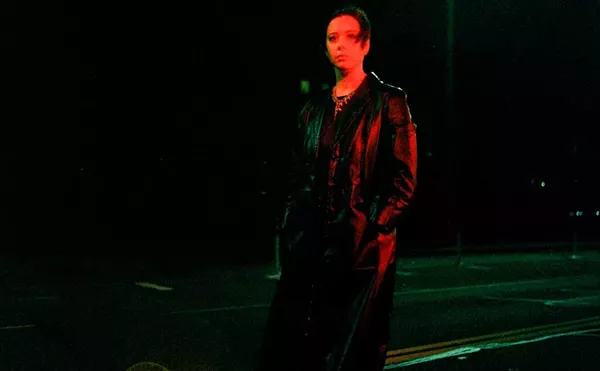
Audio By Carbonatix
[
{
"name": "GPT - Leaderboard - Inline - Content",
"component": "35519556",
"insertPoint": "5th",
"startingPoint": "3",
"requiredCountToDisplay": "3",
"maxInsertions": 100,
"adList": [
{
"adPreset": "LeaderboardInline"
}
]
}
]
It’s the law of strawberry jam that says the further you spread something, the thinner it gets, and that’s a law easily applied to 98 percent of contemporary music. Lazy? Dismissive? Yeah, maybe. But, fuck, if one more middling indie or major-label artist is trotted across these desks and hailed as a cross between the Velvet Underground and Sly Stone, we’re gonna puke.
And so we look back. Why not? Most recorded music was done better before by those who rarely had other options. When they mean it — and certainly the Pretenders, George Harrison, and Lou Reed meant something — the music sparkles.
Pretenders
Pretenders
Pretenders II
Rhino/Sire
Chrissie Hynde had so many strikes against her. First, she was a chick playing rock ’n’ roll when it was still a predominately boys-only treehouse. Second, she left Akron, Ohio, for the UK, and was a Yank in a strange land. Third, she befriended punk fringe-dwellers (Rat Scabies, Peter Perrett) in ’77 and she could’ve easily slipped in the gutter.
What she did well was adore Iggy, Keith Richards and Ray Davies (whom she married in 1980 — talk about living in your record collection), and somehow managed to find a killer trio of dudes fond enough of her songs to play them. She was the Louise Brooks of her time, a well-read, articulate and dogged woman on the offensive, but with a beating heart. The juxtaposition made for swell songwriting and helped the band sidestep the “new wave” and “punk” tags that guaranteed a flop in America for about every new group in 1979-80 (except the Police and Elvis Costello).
James Honeyman-Scott’s simple and airy guitar playing gave the songs a kind of anthemic ring and aural melancholy, which dovetailed Hynde’s songs and personality beautifully. Groove-in-pocket trapsman Martin Chambers and steamrolling bassist Pete Farndon seemed tailored to follow Hydne’s sometimes-odd timing choices.
The Pretenders self-titled debut and its follow-up are post-punk pop stunners loaded with leather-trousered bravado and a sexual tension almost unheard-of for a woman then. There’s also longing and sorrow. Hynde was a queen at gathering and sifting an incredible range of emotions and, hence, she was more rock ’n’ roll than many of the tousle-haired combos that came before and after. Her voice put wood in boy jeans and butterflies under dresses.
Each of these tri-fold digipaks comes with a second disc of mostly unreleased stuff. The debut is crammed with fan-essential, previously unreleased demos (the measured and mannered take of “Brass in Pocket” is even slinkier than the hit version), great B-sides, live oddballs and flexi-disc releases.
Disc two from Pretenders II includes embryonic versions of “Talk of the Town” and “I Go to Sleep.” But it’s mostly a goose bump-raising live set, recorded in 1981 at Santa Monica Civic Center, featuring a band obviously amped on the adrenaline of having an American Top 10 album. You can hear the intent and joy; you can imagine the band beaming.
In the few years after these albums, Hynde would lose both Farndon (a big Johnny Thunders fan, natch) and Honeyman-Scott to ODs. The Pretenders would never be the same. These discs capture the original band’s first two albums, dressed and undressed in unmatched sonic glory.
George Harrison
Living in the Material World (CD-DVD edition)
Apple/Capitol
Though marred by its unfortunate title, Harrison’s second solo album since the Beatles’ 1970 implosion is certainly stripped down after his previous Phil Spector-helmed All Things Must Pass epic. In hindsight, this is Harrison’s most honest-sounding turn — there’s a sensitivity and innocence that’s inescapable — the sound of a spiritually evolving songwriter capturing the world around him with sadness, grace and wit.
The album and its gently commanding single, “Give Me Love (Give Me Peace on Earth)” — aided by Harrison’s patented weepy slide guitar — topped the Billboard pop charts in early summer 1973, but both are, strangely, somewhat unheralded in pop history.
The single sports a timeless anti-war relevancy, and its theme sets the album’s self-possessed tone. The lovely, tender hush of “Don’t Let Me Wait Too Long” and the elegant, prayer-like drone of “Be Here Now” (Harrison’s most beautiful song) find the guitarist at the precise moment where his songwriting matches his performing perfectly; hence, the songs resonate beneath the skin, down to the bone. And two bonus tracks — the “Bangladesh” B-side “Deep Blue” and the great but overshadowed “Give Me Love” flipside “Miss O’Dell” bring the whole thing home.
This is the album’s definitive version — it sounds like you’re in the control room listening back to the final mix. It isn’t compressed to death and the nuances of Harrison’s core of pals who played back-up — including bassist Klaus Voorman, drummer Jim Keltner and keyboardist Nicky Hopkins — come through. The full-color, 40-page booklet features previously unpublished pics and Harrison’s song notes and hand-scrawled lyrics.
The second disc is a DVD whose highlights are an alternate of “Miss O’Dell” and “Sue Me Sue You Blues” acoustic, plus a live “Give Me Love” video (from Tokyo, 1991) with both a stereo and a surround mix.
Lou Reed
Coney Island Baby
Sony-Legacy
Coney Island Baby is the third in the holy trio of great Lou Reed records — alongside Transformer and Rock ’n’ Roll Animal — that gives weight to the notion that Reed’s either a wily romantic with gutter-envy or a bogus hard-ass unable to hold his own in a bar-closing fight where a chick is the only one he’s physically able to defeat. Reed’s like an adequate novelist; kind of a fake, but a good slumming observer and colorist capable of sarcasm (“A Gift”), empathy (the title track) and scene-setting (“Ooohhh Baby”). Released when Jaws was waning at the box office, CIB seems strange in its context — particularly the valium-hazy, let’s-kill-someone “Kicks” — and it’s as baffling as any album that charted in Billboard’s Top 100. With spare guitar, bass, drums and vocal arrangements, the songs are as hummable as anything on the Velvets most singsong album, Loaded.
This reissue, which was overseen by Reed, sounds great, remastered with a gentle hand; it’s musically dynamic and lines up well sonically with other Sony/Legacy titles. The disc also rounds up six bonus songs (including the great “Nowhere At All” and the Velvet-repetitious “Leave Me Alone”) from 1975.
Brian Smith is features editor of Metro Times. Send comments to bsmith@metrotimes.com




